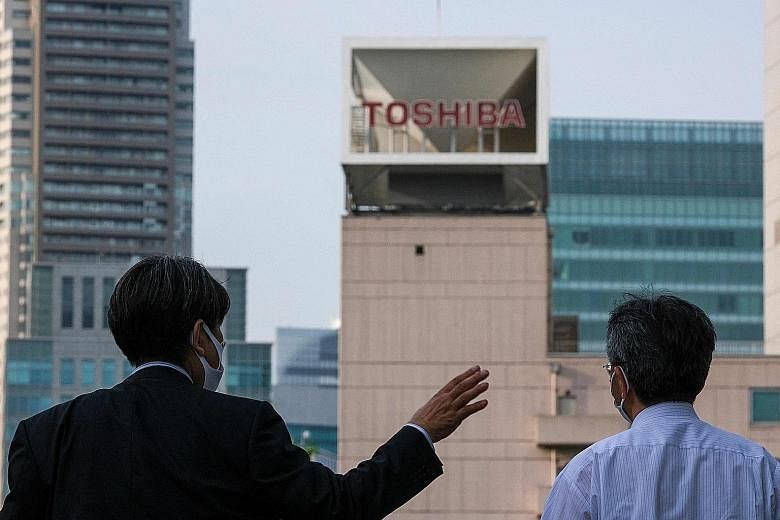TOKYO • Last year, when a little-known investment firm called for some new blood on the board of faded Japanese industrial giant Toshiba, the company's leadership was less than receptive.
But rather than taking its case to its shareholders, Toshiba made a secret request to Japan's powerful trade ministry: "Beat them up."
The plot backfired and Toshiba itself has taken the beating.
Shareholders - led by Effissimo Capital Management, based in Singapore - forced the company to commission an independent investigation that revealed underhanded tactics, implicating top executives, senior bureaucrats and even the prime minister's office.
Toshiba's chief resigned before the report was complete and its release last week has shaken Japan's interconnected worlds of business and government.
The clash is the most dramatic example yet of the challenge that a newly empowered class of activist investors is posing to Japan's old industrial titans and the government officials who support them.
The activists have found an opening as the country has moved to free up capital markets and overhaul business practices in an effort to boost anaemic growth in the world's third-largest economy.
The Toshiba case shows both the progress that Japan has made on that front and the resistance that endures.
Shareholders' success in compelling the company to expose the backroom dealings, analysts said, demonstrates that the government-led changes have made it more difficult for Japan Inc to hide behind an opaque style of business management.
But the revelations also highlight the entrenched aversion in Japan's government offices and boardrooms to the kinds of muscular shareholder interventions in corporate management that are common in other rich countries.
"The government wanted to have its cake and eat it too," said Mr Nicholas Benes, a representative director of the Board Director Training Institute of Japan, a non-profit organisation that offers guidance on corporate governance.
Toshiba remains important for the government because of its nuclear power business and defence industry links.
That Effissimo was able to involve itself so deeply in the company's affairs is a relatively new phenomenon in Japan.
For years, politicians, companies and the public alike viewed assertive shareholders as little more than shakedown artists set on wringing profits out of their targets through financial chicanery.
But attitudes have changed since 2012, when Mr Shinzo Abe, the then newly elected prime minister, pledged to pull Japan out of decades of stagnant growth by fundamentally transforming the way the country did business.
The efforts to improve profitability and increase companies' attractiveness to foreign capital made it more difficult for them to ignore shareholders.
The number of public demands made by activist investors on Japanese companies has skyrocketed from just 11 in 2013 to 165 last year, making Japan the second-largest market for such activity, according to data collected by Activist Insight, an industry news service.
Unlike in the United States, where corporations often prioritise shareholders' interests, Japanese companies have tended to put them behind those of other stakeholders.
But the more vocal activist investors still have many sceptics, even in the halls of the Ministry of Economy, Trade and Industry (Meti), which has been a leader in pushing companies to be more shareholder-oriented, said Dr Ulrike Schaede, a professor of Japanese business at the University of California, San Diego.
"They want the good activists, they want the companies that come in and are helpful, but at the same time, they want to defend against the vultures," she said.
Toshiba presented particularly fertile ground for a confrontation between activist shareholders and Japan's old guard. A doyenne of Japanese industry, the company pioneered laptop computers and invented flash memory.
But its reputation has been damaged by a series of major scandals and a disastrous investment in US nuclear power company Westinghouse that knocked it out of the top tier of the Tokyo Stock Exchange for more than three years.
Mired in serious debt, the company was forced to sell off a valuable memory chip business and issue new shares.
The proportion of the company held by foreign investors reached as high as 72 per cent, an unusual situation for a firm of its pedigree.
Effissimo soon became its largest single shareholder, with a stake approaching 10 per cent.
At the annual shareholders' meeting, Toshiba's slate of directors prevailed. But after news reports described voting irregularities and shady tactics, Effissimo helped lead a shareholder revolt, demanding an independent investigation into the board's election.
The investigators concluded that Toshiba had colluded with officials from Meti to thwart Effissimo and other shareholders.
Their report describes efforts to pressure Effissimo and two other large shareholders in Toshiba - the Singapore-based 3D Investment Partners and Harvard University's endowment fund - to protect Toshiba's leader Nobuaki Kurumatani and to secure the company's preferred slate of directors.
The pressure tactics failed to stop Effissimo.
But they succeeded, the report found, in dissuading the Harvard fund from exercising its votes.
Still, the election's outcome was unchanged.
Chaos has since engulfed Toshiba. Four directors have effectively been forced off the board and more heads are likely to roll at the company's annual shareholders' meeting this week, as proxy adviser firms have urged investors to vote down the current management.
NYTIMES

